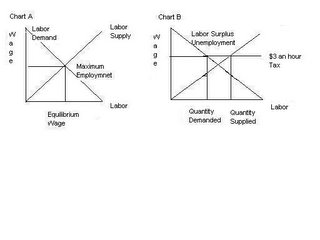An argument is fast approaching in Congress about what to do with cable and satellite television pricing. As eloquently described in the Christian Science Monitor, there are two schools of thought:
whether paying for TV channels should be like shopping at the supermarket, where customers choose the products they purchase, or like buying a newspaper, which comes packaged with the same sports, business, and comics sections regardless of whether readers want them all.
And since we're all slaves to the Tube, this is a pretty darn important argument. So if you don't think you have an opinion on this, you better get one.
Personally I hate the idea of paying for something I don't use. Like for instance, cable TV in general. I'm rarely home, and when I am, it's generally in front of a computer. I get my news and information from the Internet, I get my movies from Netflix, and I get my TV from whatever I can tune in with a pair of rabbit ears and a roll of tin foil. Time Warner, Cablevision, and their dastardly posse of overpriced pawn brokers can go pound sand for all I care.
When I did subscribe to cable, I always felt that I was getting the shaft for having to pay for some 65 to 70 channels when I only really watched nine or ten. For years I pined for a subscriber service that allowed me to pay for only the channels I wanted to watch.
Now, the opponents of the pay-for-what-you-watch idea have a number of reasons why people should continue to pay more to watch less. Among them, the cable companies claim you will actually pay a higher bill if they switch from the current bundled pricing system to the a la carte model. But they'll find any excuse they can to raise rates.
Supporters of minority programming claim that Latino and African-American programming will suffer because they will not be able to reach enough viewers. Basically, what they're telling us is if white households aren't getting Tavis Smiley, then he'll be kicked off the air. This is a specious argument. Engaging programming and willing audiences will always find each other in the entertainment marketplace.
Thanks to technology we live in an age when we can tailor our entertainment options down to the finest detail. We can creat our own music mixes of our favorite artists. We can DVR our favorite TV programs without commercials. We can train our satellite radios to play only our favorite songs. Why shouldn't we be allowed to pick and choose the cable stations we want on our dial?


